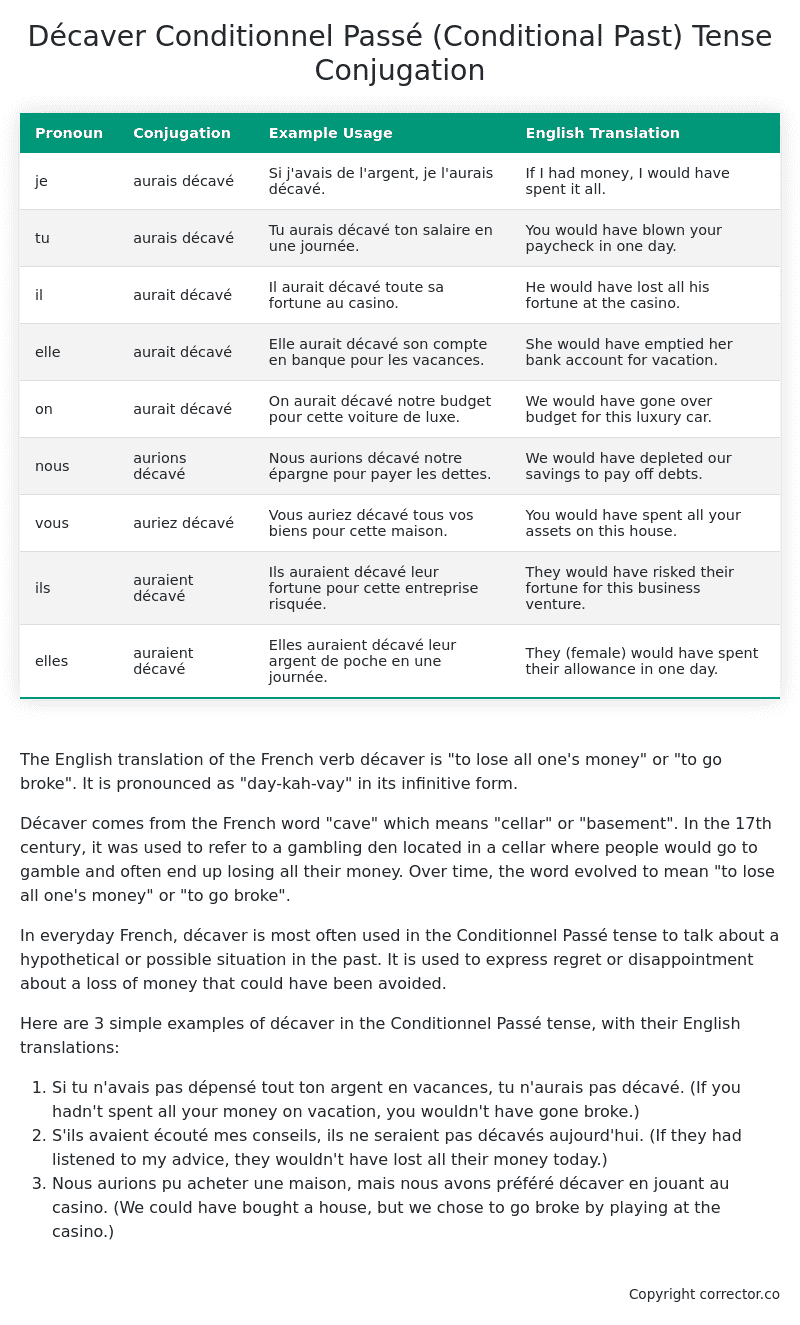Conditionnel Passé (Conditional Past) Tense Conjugation of the French Verb décaver
Introduction to the verb décaver
The English translation of the French verb décaver is “to lose all one’s money” or “to go broke”. It is pronounced as “day-kah-vay” in its infinitive form.
Décaver comes from the French word “cave” which means “cellar” or “basement”. In the 17th century, it was used to refer to a gambling den located in a cellar where people would go to gamble and often end up losing all their money. Over time, the word evolved to mean “to lose all one’s money” or “to go broke”.
In everyday French, décaver is most often used in the Conditionnel Passé tense to talk about a hypothetical or possible situation in the past. It is used to express regret or disappointment about a loss of money that could have been avoided.
Here are 3 simple examples of décaver in the Conditionnel Passé tense, with their English translations:
- Si tu n’avais pas dépensé tout ton argent en vacances, tu n’aurais pas décavé. (If you hadn’t spent all your money on vacation, you wouldn’t have gone broke.)
- S’ils avaient écouté mes conseils, ils ne seraient pas décavés aujourd’hui. (If they had listened to my advice, they wouldn’t have lost all their money today.)
- Nous aurions pu acheter une maison, mais nous avons préféré décaver en jouant au casino. (We could have bought a house, but we chose to go broke by playing at the casino.)
Table of the Conditionnel Passé (Conditional Past) Tense Conjugation of décaver
| Pronoun | Conjugation | Example Usage | English Translation |
|---|---|---|---|
| je | aurais décavé | Si j’avais de l’argent, je l’aurais décavé. | If I had money, I would have spent it all. |
| tu | aurais décavé | Tu aurais décavé ton salaire en une journée. | You would have blown your paycheck in one day. |
| il | aurait décavé | Il aurait décavé toute sa fortune au casino. | He would have lost all his fortune at the casino. |
| elle | aurait décavé | Elle aurait décavé son compte en banque pour les vacances. | She would have emptied her bank account for vacation. |
| on | aurait décavé | On aurait décavé notre budget pour cette voiture de luxe. | We would have gone over budget for this luxury car. |
| nous | aurions décavé | Nous aurions décavé notre épargne pour payer les dettes. | We would have depleted our savings to pay off debts. |
| vous | auriez décavé | Vous auriez décavé tous vos biens pour cette maison. | You would have spent all your assets on this house. |
| ils | auraient décavé | Ils auraient décavé leur fortune pour cette entreprise risquée. | They would have risked their fortune for this business venture. |
| elles | auraient décavé | Elles auraient décavé leur argent de poche en une journée. | They (female) would have spent their allowance in one day. |
Other Conjugations for Décaver.
Le Present (Present Tense) Conjugation of the French Verb décaver
Imparfait (Imperfect) Tense Conjugation of the French Verb décaver
Passé Simple (Simple Past) Tense Conjugation of the French Verb décaver
Passé Composé (Present Perfect) Tense Conjugation of the French Verb décaver
Futur Simple (Simple Future) Tense Conjugation of the French Verb décaver
Futur Proche (Near Future) Tense Conjugation of the French Verb décaver
Plus-que-parfait (Pluperfect) Tense Conjugation of the French Verb décaver
Passé Antérieur (Past Anterior) Tense Conjugation of the French Verb décaver
Futur Antérieur (Future Anterior) Tense Conjugation of the French Verb décaver
Subjonctif Présent (Subjunctive Present) Tense Conjugation of the French Verb décaver
Subjonctif Passé (Subjunctive Past) Tense Conjugation of the French Verb décaver
Subjonctif Imparfait (Subjunctive Imperfect) Tense Conjugation of the French Verb décaver
Subjonctif Plus-que-parfait (Subjunctive Pluperfect) Tense Conjugation of the French Verb décaver
Conditionnel Présent (Conditional Present) Tense Conjugation of the French Verb décaver
Conditionnel Passé (Conditional Past) Tense Conjugation of the French Verb décaver (this article)
L’impératif Présent (Imperative Present) Tense Conjugation of the French Verb décaver
L’infinitif Présent (Infinitive Present) Tense Conjugation of the French Verb décaver
Struggling with French verbs or the language in general? Why not use our free French Grammar Checker – no registration required!
Get a FREE Download Study Sheet of this Conjugation 🔥
Simply right click the image below, click “save image” and get your free reference for the décaver Conditionnel Passé tense conjugation!

Décaver – About the French Conditionnel Passé (Conditional Past) Tense
Formation
Common Everyday Usage Patterns
Expressing Unreal Past Scenarios
Polite Requests or Suggestions
Expressing Doubt or Uncertainty
Interactions with Other Tenses
Conditional Present
Indicative Past Tenses
Conditional Future
Summary
Want More?
I hope you enjoyed this article on the verb décaver. Still in a learning mood? Check out another TOTALLY random French verb conjugation!


